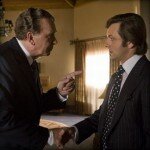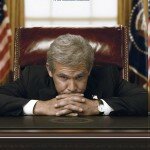Australian audiences have been spoilt with quality this summer as with any Oscar season, and while many of the high contenders gain later releases to create worldwide awards buzz, Frost/Nixon is a gift to Australian moviegoers with a comparatively early Boxing Day release. It comes at a time where change is imminent within political power and world affairs (Barack Obama’s inauguration among other things) and journalism has reached to a more technologically savvy state, but what Frost/Nixon and the Watergate scandal represents in history and shows some 30 years later is more than just a cover-up.
The ‘Watergate’ scandal centres around burglars trying to bug the Watergate building who were in fact indirectly paid by US President Richard Nixon through embezzled funds from his committee to re-elect, of which many members were also involved. Unravelled by journalists Carl Bernstein and Bob Woodward, Nixon resigned as President of the United States mid-term and remains the only leader to do so. Talk-show host David Frost, an Englishman, saw Nixon as a compelling character and used much of his own money to finance a series of interviews that covered his personal life as well as the infamous scandal.
It remains an important incident in American history; still their most watched TV news event, Frost’s interviews eventually came to reveal the rawness of one man – shocked viewers witnessed a leader who deceived his people as lonely and repentant (well, for the most part). It’s no surprise that it comes to the big screen at this time, when sadly, doubt and uncertainty doesn’t come as a shock to many American citizens. Directors with strong political views have a sense of what will reach out to people when tackling historical events, and having already been a successful play under screenwriter/playwright Peter Morgan there was a strong certainty of cinematic success. Ron Howard has rarely faltered with his directorial fare, so in theory, translating a piece of investigative journalism should be a simple task. Frost/Nixon’s ending is not the stuff of secrets, but within that circumstance there is always the challenge to make the preceding scenes just as enthralling as the climax…
|
|
Presented with a documentary-style insight into the interviews; how they came to be, the research undertaken by Frost’s team and the pressure both parties were under, we are taken into the happening in between re-enacted accounts as time passes both before and during the process. The tapes themselves were recorded over 28 hours and the interviews shown over four nights, and the film really kicks into gear once the cameras are rolling. What’s re-enacted of the interviews for the film’s purpose centres on the more pressing political issues and is most engrossing, with the ferocious tension between Michael Sheen’s Frost and Frank Langella’s Nixon magnificent. Their chemistry transcends from stage to screen perfectly, both having been involved in the original play, and the final confrontation on Watergate is as explosive as the subject lets it be. They are complimented by faultless support. Sam Rockwell shines as frustrated Nixon researcher/author James Reston Jr, while Kevin Bacon’s villainy as Nixon’s Chief of Staff Jack Brennan adds punch. Oscar buzz surrounds both leads, but the hype may prove true with Langella. Having won a Tony Award in 2007 for his portrayal in the original stage production, his mannerisms and voice are truly amazing and his admissions put you at unease regarding whether or not to sympathise.
Many Americans felt that Nixon didn’t answer up to Watergate, so what happened with the Frost interviews was something of closure for the public. The fact he never stood trial angered many, and the film acts upon this as the reason he was encouraged to do it. Frost/Nixon does play with Hollywood – after all, Hollywood is essentially the media and its interaction with famous people and small character traits may be heightened to serve a greater purpose – but not done for the sake of it. It instead finds itself blended in with the bigger picture, which is about one desperate man attempting to reveal the desperation of another. Howard uses the close-up, blurred vision and tense silences as revealing techniques to let us see inside these men. Yes, Frost too – after all, it’s not just Nixon who had a lot riding on the interviews. It’s a fascinating picture from both sides of why men, humans, are desperate, and the different reasons for making decisions which may cost more than just a reputation.
Watergate and consequential events are explained primarily with actual footage in between character accounts, but it’s here that it can’t win 100 percent. With such a big scandal, that isn’t Howard’s or anyone’s fault, but prior knowledge is beneficial to really understanding the tension and importance of these interviews and therefore the film. Even Frost would have taken from fellow journalists Bernstein and Woodward and their account (that other little Nixon/Watergate book/film from 30 years before, All The President’s Men) and used the information accordingly. Frost/Nixon is a perfect counterpart to the original Watergate film in feel, style and content. Not just on the subject of the President, but on investigative journalism itself, and the extensive research and information obtained to take such a man down.
Conclusion:
In a time where political corruption is still rife in parts of the world, there’s no question Frost/Nixon is well timed. Powerfully directed, brilliantly acted, this stands as one of the films of 2008. It benefits from having less hype than other films of its calibre because it doesn’t disappoint expectations. A must for any budding journalist or history enthusiast and for those wanting a hard-hitting drama Frost/Nixon is more than adequate.
[Rating: 4.5/5]
 Follow the author Katina Vangopoulos on Twitter.
Follow the author Katina Vangopoulos on Twitter.

















